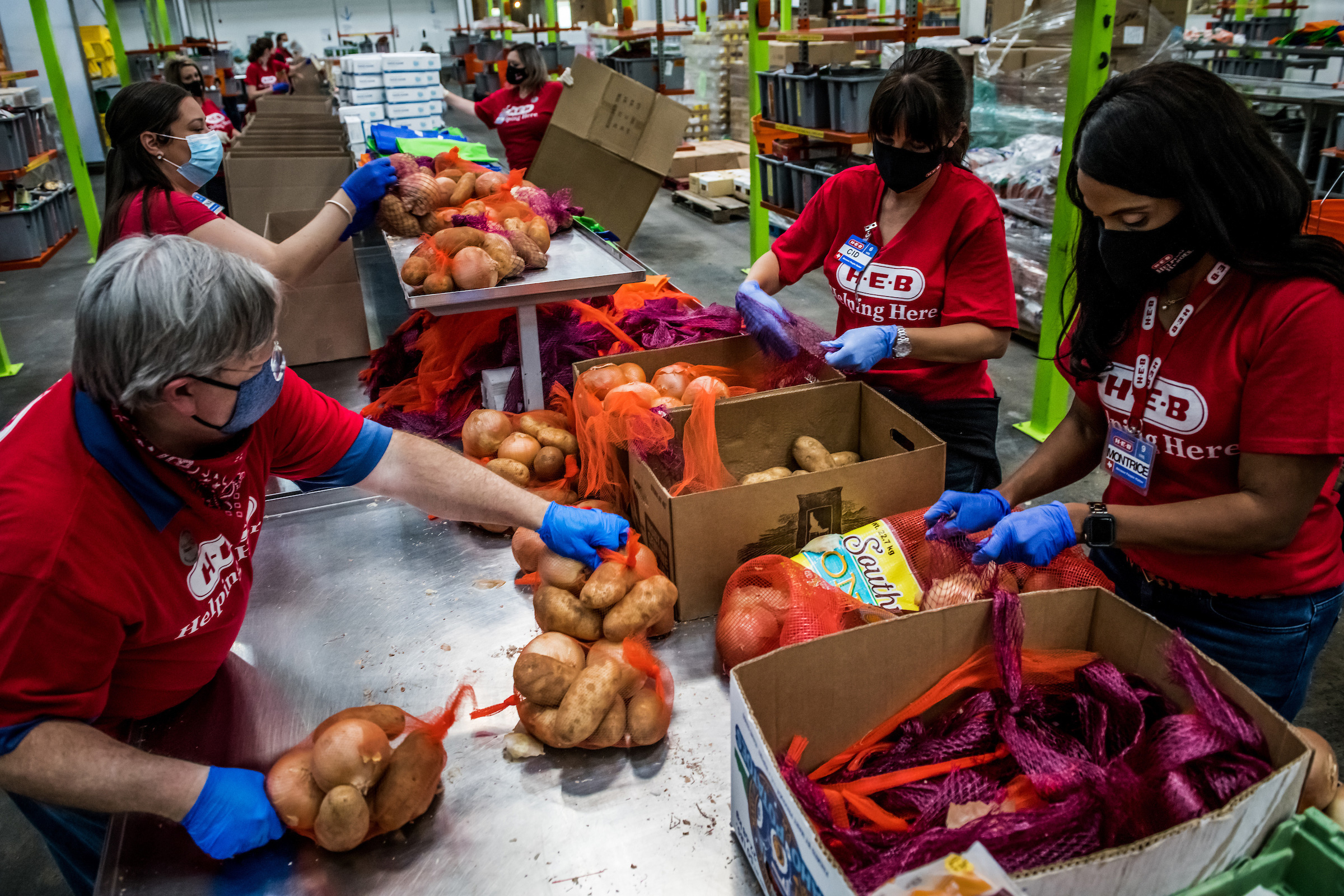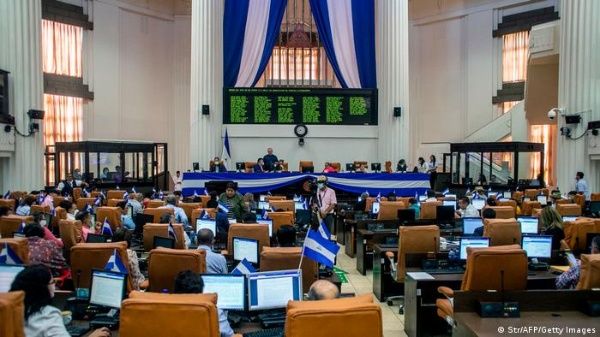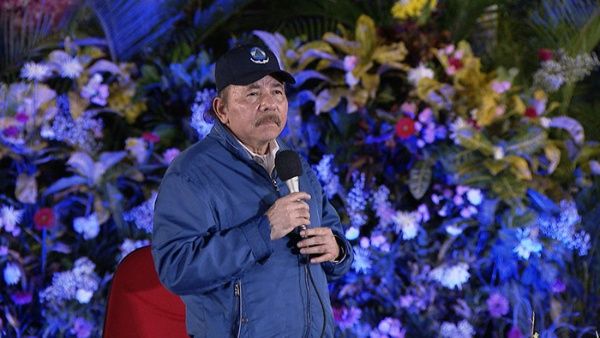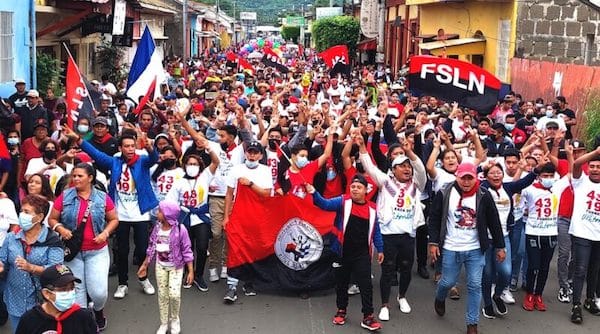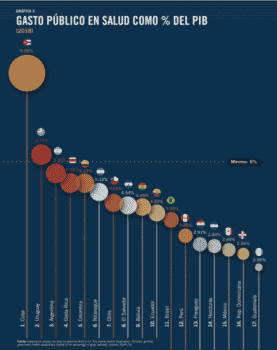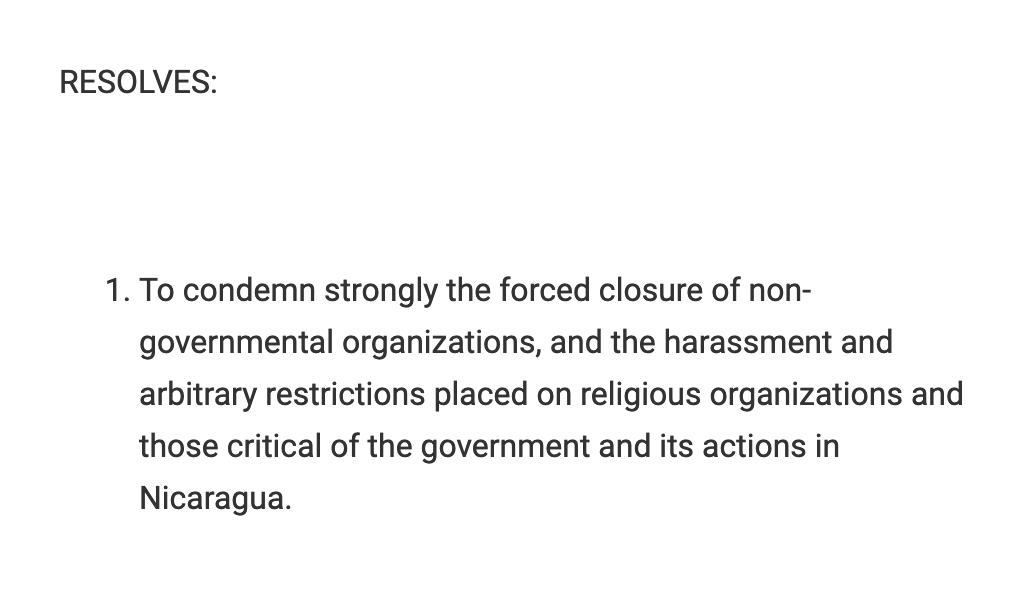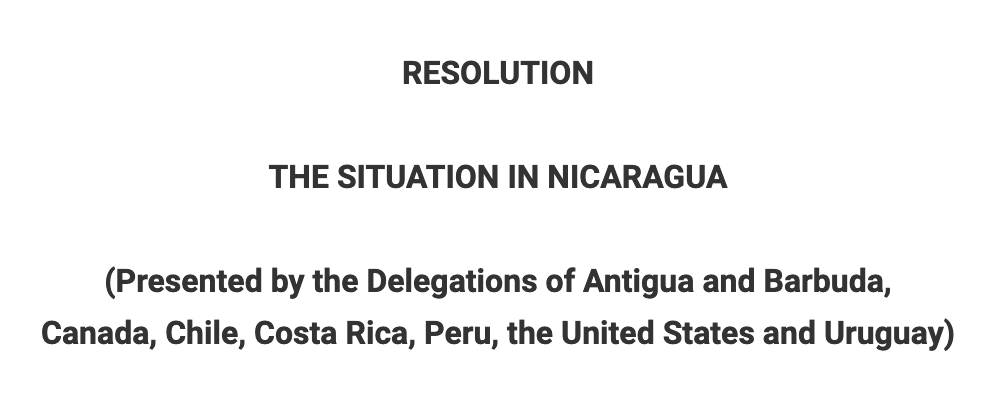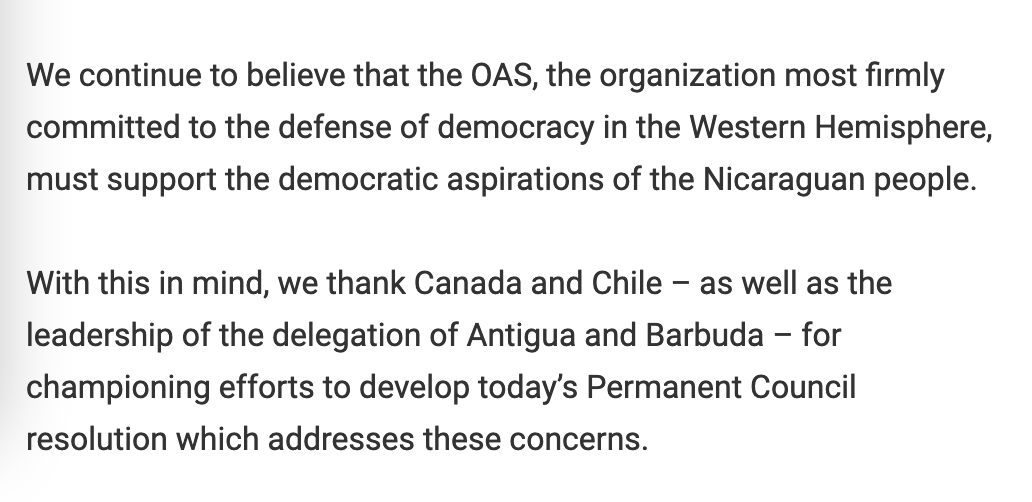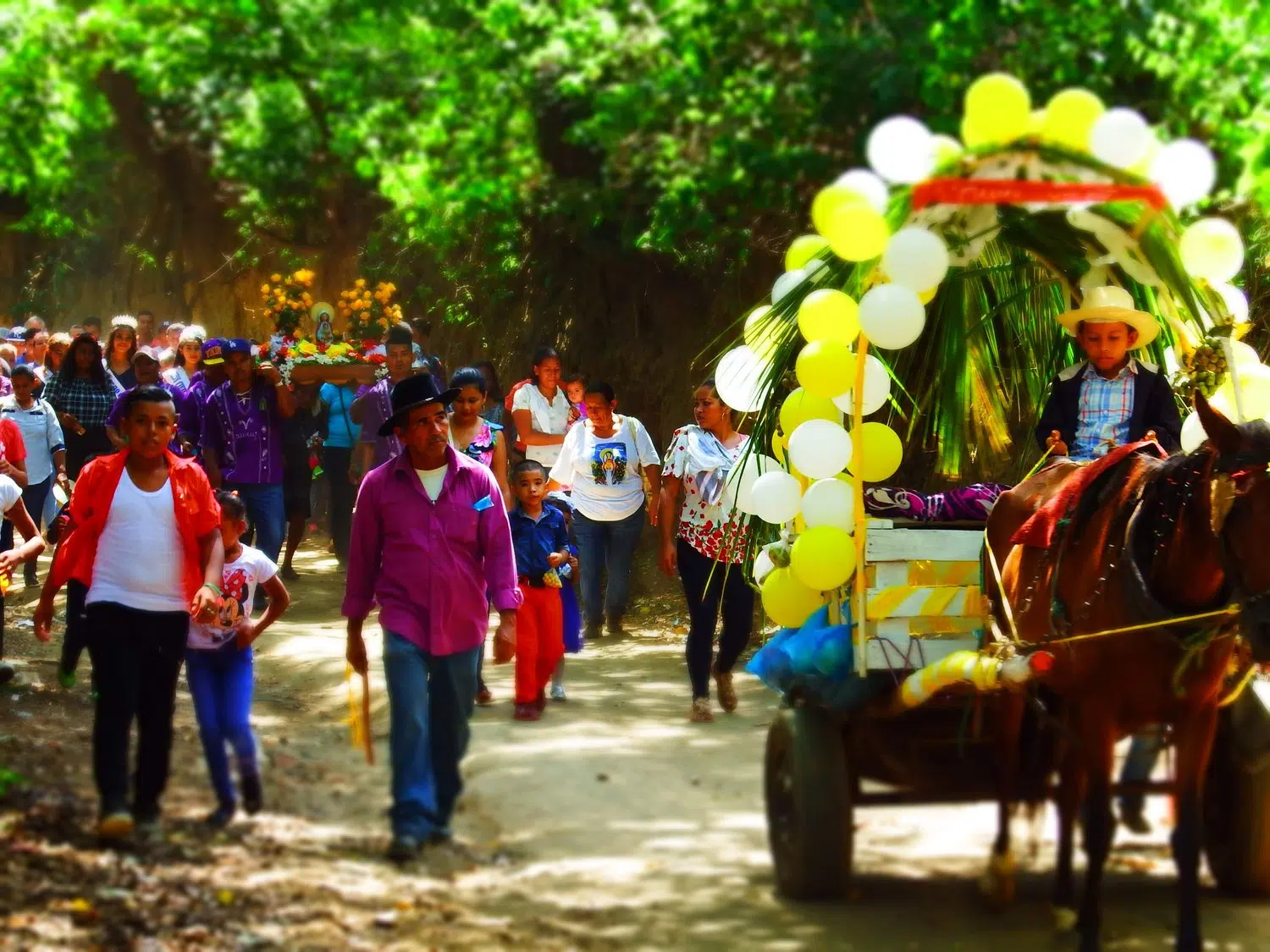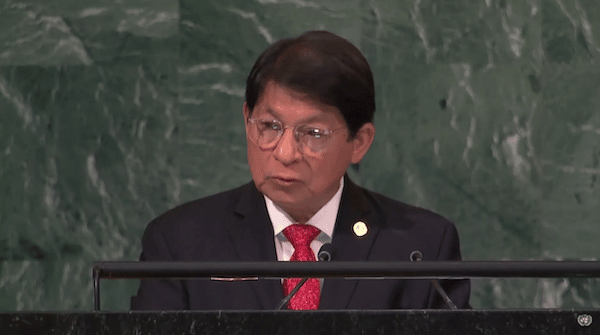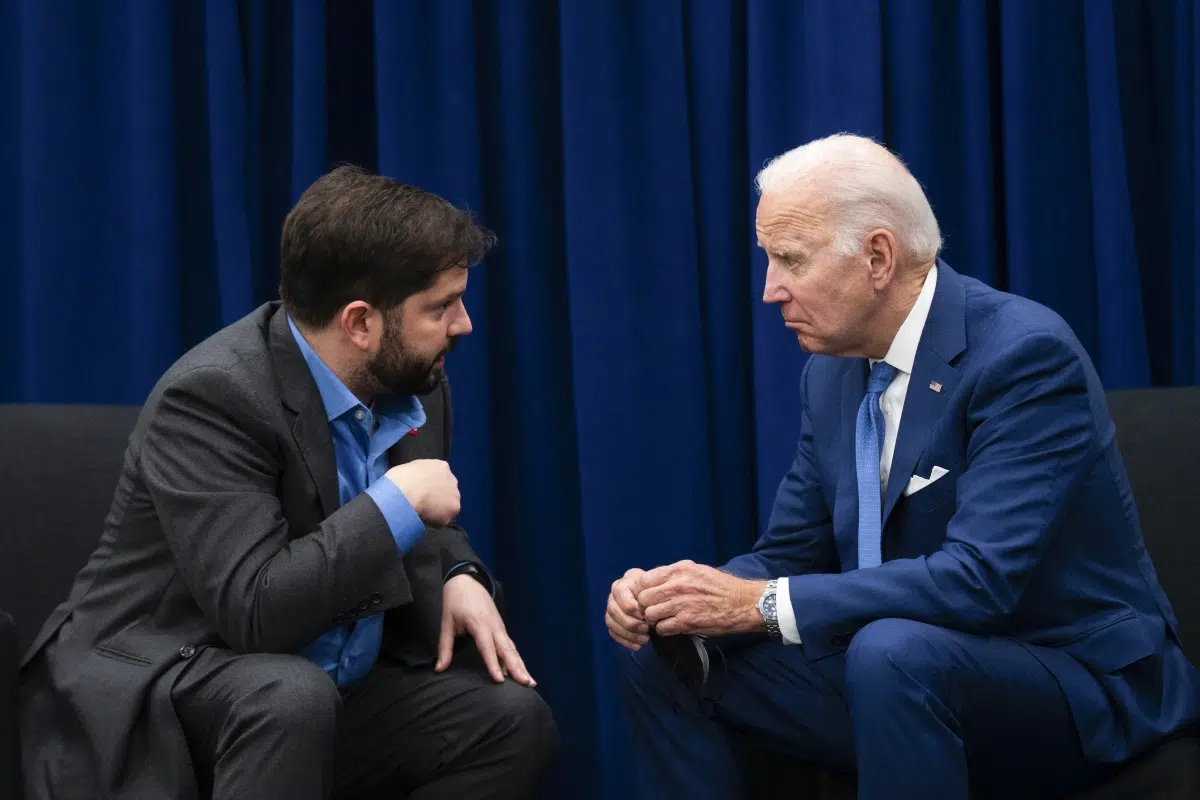Nicaragua a ‘Dictatorship’ When It Follows US Lead on NGOs
JOHN PERRY

AP (6/2/22) reported that “the government seems intent on wiping the landscape clean of any organization it does not control.”
President Daniel Ortega’s government in Nicaragua is “laying waste to civil society,” according to the Associated Press (6/2/22). The Guardian (6/2/22) called it a “sweeping purge of civil society,” while for the New York Times (2/14/22), Nicaragua is “inching toward dictatorship.” According to the Washington Post‘s Spanish edition (5/19/22), the country is already “a dictatorship laid bare.” In a call echoed by the BBC (5/5/22), the UN human rights commissioner urged Nicaragua to stop its “damaging crackdown on civil society.”
What can possibly have provoked such widespread criticism? It turns out that the Nicaraguan National Assembly’s “sweeping purge” was the withdrawal of the tax-free legal status of a small proportion of the country’s nonprofit organizations: just 440 over a period of four years. In more than half the cases, these non-governmental organizations (NGOs) have simply ceased to function or no longer exist. In other cases, they have failed (or refused) to comply with legal requirements, such as producing annual accounts or declaring the sources of their funding. Modest legal steps that would go unnoticed in most countries are—in Nicaragua’s case—clear evidence that it is “inching toward dictatorship.”
None of the media reports asked basic questions, such as what these nonprofits have done that led to the government taking this action, whether other countries follow similar practices, or what international requirements about the regulation of nonprofits Nicaragua is required to comply with. There is a much bigger story here that corporate media ignore. Let’s fill in some of the gaps.
Three basic questions
There are three basic questions. First, is Nicaragua exceptional in closing nonprofits on this scale? No, the practice is widespread in other nations. While figures are difficult to find, government agencies in the United States, Britain, Australia and elsewhere have closed tens of thousands of nonprofits in the last few years.
For example, between 2006 and 2011, the IRS closed 279,000 nonprofits out of a US total of 1.7 million; it closed 28,000 more in 2020. The Charity Commission in Britain closes around 4,000 per year. And in Australia, some 10,000 nonprofits have been closed since 2014, one-sixth of the total. In Nicaragua, four years of closures have so far affected only 7% of a total of more than 6,000 nonprofits.

Reprinting an AP story, the Guardian (6/2/22) used scare quotes to suggest that NGOs that took foreign money were not really “foreign agents.” When the paper (9/20/18) reported that “Washington has ordered two Chinese state-run media agencies to register as foreign agents,” quotation marks were not seen as necessary.
Second, does Nicaragua impose tighter rules than other countries? Again, the answer is no. Rules introduced in 2020 required nonprofits to register as “foreign agents” if they receive funds from abroad: The AP report (6/2/22; picked up by the Guardian, 6/2/22) puts this in scare quotes, but the term is borrowed from the far heavier requirements that have applied in the US since 1938 under the Foreign Agents Registration Act (FARA). The Financial Times (4/10/20) dubbed the Nicaraguan legislation “Putin’s Law,” erroneously linking it to Russia, not the United States.
The US has some of the world’s strongest and most detailed powers, but they are not unique: The Library of Congress has examples of 13 countries with similar legislation. In Britain, the government consulted last year on the introduction of a “Foreign Influence Registration Scheme,” which is similar to FARA. Nicaragua’s law is not exceptional, and nor were its consequences in reducing NGO numbers; when Australia introduced similar laws in 2014, there were 5,000 nonprofit closures in the following year as a result.
An important factor is that Nicaragua, like other countries, has to comply with international regulations that address the risks posed by unregulated nonprofits. These include widespread international concern that nonprofits are susceptible to money-laundering.
Whether deliberately or out of ignorance, media ignore the fact that the Financial Action Task Force (FATF), set up in 1989 by the G7 governments, imposes rules that apply globally. In 2020, Nicaragua was praised by the FATF for “largely complying” with its requirements. FATF specifically endorsed the tougher controls and the sanctions for non-compliance that the government introduced, including the threat of withdrawing an organization’s legal status.
Third, have nonprofits been given time to comply with the rules? According to the Guardian (6/2/22), “the government was not giving them an opportunity to get in line with new legal requirements,” yet I know this to be untrue. I have talked to leaders of several nonprofit organizations who have completed the process or are working their way through it. The rules are tough, and the government ministry is under-resourced for the task it has been given, but hundreds of NGOs are taking steps to comply. Many of those who fail the test are given the option of reconstituting themselves as businesses without tax-free status.
Rules apply to good and bad alike

In testimony to Congress, the heads of the groups that funnel US government money to overseas NGOs “boasted about their ability to change foreign governments” (Lobe Log, 7/3/18).
Do the media ask if Nicaragua might have introduced these stringent laws because of obvious transgressions by nonprofits? No: On the contrary, the media assume that the NGOs’ complaints about the rules are justified.
The reports make only dismissive reference to the recent history of abuses by some Nicaraguan NGOs. They ignore the key fact that some of them existed principally to channel millions of dollars in US funding into activities that blatantly interfered in Nicaraguan politics. They ignore the largesse of agencies funded by the US government, such as the National Endowment for Democracy (NED) and USAID, which poured money into Nicaraguan NGOs after President Daniel Ortega was voted back into office in 2007, with the specific aim of training people to oppose his government and create the conditions for regime change.
That the NED, USAID and other US agencies use national NGOs in this way is hardly a secret. Global Americans (1/5/18) reported that the NED was “laying the groundwork for insurrection” in Nicaragua in 2018; Lobe Log (7/3/18) revealed that the National Endowment for Democracy had bragged to Congress about its efforts to create young disciples of regime change, and the Council on Hemispheric Affairs (10/2/19) described in detail the indoctrination process in which they took part.
Of course, this interference has been happening for decades across the world. Six years ago, Telesur (6/8/16) showed how it worked in Venezuela, Ecuador and Bolivia. Similar activities funded by the NED and allied agencies have been carried out in Croatia, Russia, Ukraine, Poland and many other countries.

The New York Times (2/14/22) speaks of Nicaraguan private education in the past tense, writing that “universities had been among the last remaining centers of resistance”—before going on to acknowledge in passing that six colleges remain private for every one that was nationalized.
The Financial Times (4/10/20) went so far as to quote the NED’s Aimel Ríos, who urged tougher international pressure on Nicaragua: “It does seem that is the only language the regime will understand,” he said. The obvious conflict of interest went unchallenged. Contrast this with the media’s hypervigilance about any suggested interference by Russia or China in Western politics.
Apart from the political issues, there is a wider question of the value of nonprofit organizations to Nicaraguan society. It must be said, of course, that many nonprofits do excellent humanitarian work. But there are significant exceptions, quite apart from the examples above.
For example, local “human rights” bodies have been totally partial in their work, becoming little more than propaganda merchants, as I have shown elsewhere. Many of the medical bodies now closed also existed mainly as propaganda organizations, rather than as genuine professional institutions—particularly during the pandemic, when they attempted (with some initial success) to deter people from using the public health service.
Some private universities have lost their status for failing to produce accounts, and have been taken over by the state. Far from the impression given by the New York Times (2/14/22), I have been told by various academics working with their former students that they are much happier now that they have access to better, state-run facilities. Their fees are fixed and they no longer have to pay extortionate fees (in some cases, $1,000) to graduate.
The Washington Post (6/2/22) picked out for criticism the closure of the “94-year-old Nicaraguan Academy of Letters.” Yet one of its board members admitted that it was in “total administrative disorder” and had never complied with requirements to file its accounts, even though it was receiving $62,000 in government funds each year.
‘To advance US interests’

In Nicaragua, a country that has experienced a century of military occupation, CIA-backed guerilla warfare and ongoing efforts at regime change, openDemocracy (6/1/22) presents a registration requirement for NGOs that take foreign money as “a policy of sweeping away any form of organization that is not under state control.”
Perhaps the wildest claims about the importance of NGOs have been made by openDemocracy (6/1/22), a nonprofit web outlet that claims it “challenges power, inspires change and builds leadership among groups underrepresented in the media.” Many services for women, such as reproductive health services, “are vanishing,” it says, repeating claims made by a Nicaraguan NGO that refuses to comply with the new laws. Without them, apparently, “prospects…are bleak.”
The article seriously misrepresented the situation of women’s health in Nicaragua, which has one of the best public health services in Central America, free to all. It has, for example, reduced maternal mortality from 92.8 deaths per 100,000 live births in 2006, to 31.6 in 2021, a reduction of 66%. In part, this is due to its 180 casas maternas, which offer dedicated care to pregnant women. The state also provides family planning free of charge in all health centers, including tubal ligations for women who do not wish to have more children.
It is true that many NGOs provide healthcare, often with foreign funding, and most of these are perfectly happy to register under the new legislation and continue working in cooperation with the health ministry.
It is of course almost inconceivable that Nicaragua can be given any credit in the media for its achievements in healthcare, or many other aspects of social provision. As FAIR has pointed out on various occasions, corporate media are consistent in making every news story an attack on Nicaragua’s Sandinista government, with no attempt at balance or genuine investigation of stories presented to them by the government’s opponents, especially those coming from the hostile Nicaraguan media.
The US State Department begins its summary of its policy on “US Relations With Nicaragua,” updated last September, with the surprisingly honest statement that “the US government works to advance US interests in Nicaragua.” Sadly, the international media appear to do the same.
https://fair.org/home/nicaragua-a-dicta ... d-on-ngos/
******************
Nicaragua’s Finance Minister Ivan Acosta: “We are going to have GDP growth … of between 4 and 5%, which is important!”
June 16, 2022
[This interview by Dennis Schwartz took place on the Revista En Vivo program on Nicaragua’s Channel 4 on June 8, 2022. The interview has been edited for length. Translation by Tortilla con Sal and AfGJ. The entire interview can be watched here:
https://www.youtube.com/watch?v=uTiAukig1hs]

Finance Minister Ivan Acosta appearing on the Channel 4 program Revista en Vivo.
Dennis Schwartz: Let’s start! How has May been economically for our country? How is our economy doing?
Minister Iván Acosta: The year 2021 was an exceptional year in economic performance, in growth, across all the numbers. If we look at expenditure, it means that the construction of roads is accelerating, the momentum in drinking water and sanitation is continuing; more resources are being invested to make an impact on employment and above all on the welfare of the population.
In the first months of this year, up until May 2022, 22,000 new jobs have been recovered, which is also important from the point of view of the Social Security Institute records. Therefore, all indications suggest that the economic evolution of 2022, as of May 31, is in line with the projections made by the Central Bank, that we will have a GDP growth. We are not talking about the Monthly Index of Economic Activities but about Gross Domestic Product, of between 4% and 5%, which is important. Four or 5%, according to those data that you have probably seen from ECLAC and the World Bank, would place us close to those that are going to have the best performance in the economy of 2022, in spite of the turbulence and fluctuations of the international economy.
From January to May, the economy has evolved close to the estimates…. Furthermore, as regards the budgetary execution performance of public institutions the expenditure part is going at a higher pace than in 2021.
It is important to make the comparisons, 2021 was a year of a reactivation, a growth of 11.3%, the highest ever combined figure. During the COVID pandemic in Latin America there was 8.3% growth over the two years, 2020-21, and definitely those numbers have been the base scenario that we are acting on in 2022.
How much is it estimated that the economy has moved in the first five months? The third month cut-off tells us that the Monthly Activity Index is performing above 6%, as of March. And we estimate that with the fiscal data for May, economic activity is still very strong. ….
Schwartz: How has this worked out?
Acosta: First, one can see financial activity recovering, which was one of the sectors most delayed during the reactivation. Credit is increasing little by little; there is a positive impact on deposits. Deposits are [growing] close to 4%, similar to their best figures which were in March 2018, at 4%. Reserves exceed by more than US$1.5 billion the best figures of December 2017. That is, we are talking about over US$4.3 billion as against US$2.7 billion approximately.
We are talking about more than US$1.5 billion extra in reserves, so we have a much stronger Central Bank than in 2017…. We see fiscal performance expressed via taxation with a lot of activity; April was extraordinary and May is even better. So, the accumulated results from January to May in tax and fiscal terms are on a very good path and support the budget expenditures, which is the most important thing.
Schwartz: When we talk about spending, people believe that we are standing still, and in order to spend more we have to receive more, through our activity.
Acosta: Fundamentally, the budget is a question on which one probably always wonders, how is the expenditure financed? The fundamentals of the economy and the economic policies and public policies defined by President Daniel Ortega, are that most of the expenses must be financed with tax revenues. That is to say, expenditure expands as a higher growth rate of tax revenue is achieved, and this is expressed in the budget deficit.
In the last seven or eight years, or about 10 years, a decade, … the amount of resources from tax revenue, from other budget revenue, plus the evolution of previous savings allows us to finance the budget, adding in too some bond issues in the securities market and also international financing via loans or donations. If they are loans or donations these are incorporated into the budget.
When one looks in the end at what you have in your favor and what you spend, it is very important that the Nicaraguan economy, financial policy, and fiscal policy have been very prudent; that is to say, seeking the greatest efficiency and strengthening savings at opportune moments so as to be able to resist shocks such as the one in 2018, or the pandemic. I think this is very important, that is, we are always spending according to what we have, not spending beyond what we have.
Schwartz: It is very meticulous work, to be making adjustments, to be carrying it out where possible while not stopping the social programs that are fundamental. Based on this, controlling prices in fuel, energy, imports of the agricultural products that are required now that we are in the rainy season, how is it being achieved? How do we maintain it?
Acosta: The global economy is suffering from several shocks, a set of shocks that have had an impact on the global international economic performance. …. Nicaragua is part of the Global Economy, and so, since February, President Ortega has given us instructions to look ahead as best we can and to formulate solutions that guarantee the least impact on our population, on consumption, and above all to protect production.
So, what has been done? In his speeches of May 4 and May 18, President Ortega stated very clearly that we had to adjust to the new times and face the turbulence or fluctuations in the economy. And thus there are four or five containment measures that are having a positive impact to offset as much as possible the effects apparent in the global economy.
First of all, the most important, very important resources have been invested in keeping the price of gasoline, diesel and cooking gas stable. …. Secondly, there is a very meticulous management policy, the issue of the electricity rate in which there is a policy that began back in 2019, to take all measures to maintain rate stability in energy, which is another of the leading prices of the economy. If energy rises, the whole chain of productive costs rises, but it also has a direct impact on Nicaraguan families. The policy of containment measures and energy subsidy [for households where] the consumption is less than 150KWh/month has been guaranteed for a long time, but as of 2019 the electricity rate has been stabilized….
Since the Government took office in 2007, we have worked to transform the electricity generation matrix. That is to say, a very important amount is being generated, sixty or 70%, from renewables. So, this isolates it from the global impact of oil; but, there is a part which is still generated with fuel oil. So, it is important that the policies defined by Comandante Ortega include controlling those rates, and that guarantee that the rates have not fluctuated since 2019, but they have been controlled via a clear Policy of Rate Subsidy to protect the production, employment and tranquility of families.
On the other hand, there is a whole Production Promotion Policy, to ensure market supply. One of the most important issues against inflation is that there is production, and for that … we must attend to producers, we must assist, we must transfer capacities to the producers in order to guarantee good production. Besides, with a good rainy season there must be a good production and a good supply to the market.
At the end of May we can confirm that the preliminary numbers on exports show growth of 18.5% with more than US$1.88 billion exported. That18.5% rate, having closed in 2021 at US$3.6 billion, indicates that we are going to end the year above US$4.0 billion. This is a forecast, in other words, we should be above US$4 billion. Why are we going to be above US$4 billion? Because the volume of coffee exports has increased and prices are on the rise; they have reached US$335 [per hundredweight] today. Gold remains above US$1,850 [per ounce] and volumes are also increasing. …. Likewise, in products derived from sugar cane, we are talking about rum, more is being exported. Peanuts, tobacco products [mainly specialty cigars], even dairy products and beans are growing significantly with respect to 2021.
That is to say, you have a higher total export volume of 2% higher than in 2021, and in values it is 18.5% higher; this indicates that we are going to have higher exports than in 2021. I estimate about US$400 million more than in 2021, together with a positive impact on domestic demand, because there is a good volume of family remittances arriving in the country. The Central Bank said that they grew 26% in April, and I believe they will continue to grow in May.
On the other hand too, investments have been recovering. The Central Bank also announced that in 2021 it closed [foreign investments] at more than US$1.2 billion and this rhythm will continue. That is to say, if all the sectors, investors, private sectors, producers, transportation, commerce, popular commerce, popular markets continue working hard, we are going to have a very good year, regardless of the turbulence or fluctuations in the international economy.
Schwartz: That is what is foreseen at a global level, what had been calculated to be going up has in fact collapsed. But our economy, thank God, is well managed.
Acosta: The World Bank and the Monetary Fund … are very conservative, [and] with the indicators they have, they had estimated the Global Economy growing at 3.4% and they have lowered it to 0.9%. The Emerging Economies … have been adjusted by two points less, from 5.4% to 3.4%. …. In the case of Central America and even Latin America it has been adjusted down, but we have Central Bank Indicators indicating that despite the fluctuations we remain between 4% and 5%. …. So we would be in a known range, where the Nicaraguan economy has shown its performance and that is close to its potential GDP, as economists say. It is close to its described capacity.
Also, and it is very important, so I am going to emphasize this, if I am producing, if I am finding markets, and I am getting good prices, and my internal demand is supported by the family remittance transfers, and also investments are coming back; if my trade balance is going well, foreign investment and private investment are reactivating, and we have a macroeconomic stability policy keeping sufficient resources in the Central Bank, so that the banking sector is funded, and we have a good execution of expenditure, and the public investment program is at the same pace as in 2021, all of this means that you have good results, regardless of what may be forecast abroad…
So we foresee that we are going to be the economy with the best evolution in Central America.
Schwartz: We are growing economically with small and medium producers, and those who have already invested too. This creates openings, because the banks are looking for where to put more money, and they have money. Now they are the ones who are looking for clients to lend to. We are talking about this economic stability that we Nicaraguans have thanks to government policy. We say, physically healthy mind, healthy body, healthy country, healthy economy. We are advancing also by managing public investment. In relation to the priority investments that we have, what are they?
Acosta: The priority investments that have been defined since 2007 by Comandante Daniel Ortega and Compañera Rosario, who have placed great emphasis on improving the competitiveness and productivity of the country. We have concentrated on eight fundamental sectors and, of these, four are very visible.
Very visible is everything that has been done in electric energy, the electrification program whose coverage is already at 99.2%. This is very important because it gives competitiveness; it gives dignity to those who were excluded … and incorporates them as protagonists and economic agents. We are talking about 92.2% coverage after it had been at 52%, 53%, 54% until 2007 [when it began increasing].
We are rapidly approaching 6,000 kilometers [of] highways, in what we call our transportation programs, when [in the past] the most highways we had was 2,000 kilometers and of those only 600 kilometers were in good condition.
These are issues that are very visible. We are talking about building the bridge over the Wawa River, and it is not that we are thinking about it, any more than we were merely saying there will be a road to Bilwi. We are building the bridge over the Wawa River, a bridge of more than 350 linear meters.
There has been enormous progress in potable water and sanitation, bringing potable water to municipal headwaters that were excluded for centuries; we are talking about Bluefields and Bilwi too. We have invested in Chinandega and Masaya, which are Pacific departmental capitals, but we have also reached the center of the country, Santo Tomás, Acoyapa; there is an important effort in water and sanitation in Nandaime. In other words, these are broad programs, with big investments and this is very visible to the population.
Another one of the programs is the largest investment in hospital infrastructure in Central America….. World class hospitals are being built in the departmental capitals and also in the municipalities where there are now a large number of primary hospitals. We are [also] talking about … investment in the quality of services in well-known hospitals in Managua. The Manolo Morales is not the same as it was 20 years ago; the Manolo Morales has had investment in the operating theaters. In Granada US$515,00018 are being invested at this moment. ….
Here COVID could be addressed because there was planning and strategic vision by Comandante Ortega to invest in health and education. Education and health are fundamental issues that had been abandoned during the long and dark years of neoliberalism from 1990 to 2006. That has changed and it is very clearly seen in public investment. But there are also other important investments that have been advancing that are probably less noticeable; for example, the strategic improvement to the Port of Corinto.
It is well known that this is linked to economic activity, to export and import activity, but there is a national investment strategy of almost US$200 million in ports, improvement of airports, including Bluefields and Corn Island, important works of modernization.
But back to education, there is also a sustained policy of improving educational infrastructure, investing in quality, in what we would call improvements in all the pillars that influence secondary education. That is to say, not only in infrastructure but also in access to the internet, information technology, the social policies of education, the policies that minimize desertion, by guaranteeing the best conditions. The school meals program falls within this educational policy.
We are designing a program to strengthen the teacher training colleges, the entire teacher training college network, which is a very important issue. There is an effort to strengthen telecommunications. You may have heard about the broadband program that has to do with rural telecommunications, and certainly being in Managua one cannot imagine how someone from the region of El Tortuguero communicates with the rest of the country. So this is a rural telecommunications program and it is very important to incorporate it.
The ones I am mentioning are programs that of course, if you are not involved in them, then you cannot see it happening, but the whole country is getting connected, no matter from which rural hamlet you are connecting. This has been a part of the modernization of the country during the administrations of Comandante Ortega.
There is a strong momentum in production. We are strengthening our technological development centers, for example, related to improvements in research for the development of seeds resistant to climate change. We are talking about strengthening the Bovine Traceability System from IPSA, strengthening testing laboratories, and technical capacities. Infrastructure of all kinds are also focused in that area. ….
Schwartz: We address it practically every day but it is good to remind ourselves, how the international economic environment is affecting Nicaragua….
Acosta: The classic thing is that if you increase the interest rate, you have to make efforts from the production side to keep the markets supplied. In our case, in addition to keeping our market supplied and working hard for food security, we have to produce enough surpluses so we can look for food markets.
We produce a lot of food, so it is very important to produce when it is being said that there could be an international food shortage. In that case we will be able to sell more beans, more dairy products, more meat, more coffee, more sugar. It is very important to work on that in order to have enough supply for our [domestic] market and also to support our exports….
So from the point of view of ensuring that the economy is not negatively impacted, we must promote greater investment to create the necessary conditions for investment to continue. What are the basic conditions for investment to take place? Working hard for macroeconomic stability and fiscal discipline; that is to say, low deficits and monetary stability. These are a great attraction to investment and we have seen that investment continues to come, which is important.
Schwartz: In addition, there is great recognition of Nicaragua in this regard.
Acosta: There is another important issue, namely maintaining what we call debt stability. For example, there are countries here in Central America that have accumulated debt of 75% or 80% of GDP, while we are around 52% or 54%; so that is very important. There are publications with these figures, so this is public information that can be verified. These are essential indicators for investment and, when investment comes, it generates employment to counteract the threats of recession and economic decline, above all.
That is why I was telling you that there are important positive economic indicators: employment is growing, 20,000 jobs in the first four or five months of the year. That is very important. Exports are growing; production is growing. Not only exports in terms of price, but also the volume of exports is increasing.
Schwartz: Iván Acosta, Minister of Finance and Public Credit, thank you for your visit. We hope to see you soon here again. Be well.
Acosta: Thank you very much, Dennis.
https://afgj.org/nicanotes-06-16-20226














